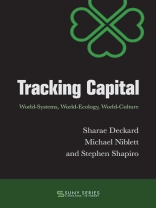Tracking Capital introduces new ways to understand the entanglement of cultural forms and practices in economic, social, and ecological crises and struggles. Building on the fundamental insights of world-systems analysis, the book offers readers a series of rubrics, keywords, and concepts—such as zemiperiphery, registration, and commodity chains—to enable more integrated, transdisciplinary methods of literary and cultural study. Throughout, Sharae Deckard, Michael Niblett, and Stephen Shapiro foreground the role of culture in both consolidating and contesting the classism, racism, sexism, and ecocide constitutive of the modern world-system. In the context of capitalism’s ongoing bloody war against the poor, the powerless, and the planet,
Tracking Capital provides tools with which to diagnose the morbid symptoms of the present, as well as to plot possible steps on the road to a better future.
Daftar Isi
Acknowledgments
Introduction
Sharae Deckard, Michael Niblett, and Stephen Shapiro
1. What Is World-Systems for Cultural Studies?
Stephen Shapiro
2. Registering Capitalist Nature: Conjectures on World-Ecological Literature
Sharae Deckard
3. Tracking Capital: Commodity Chains, Commodity Frontiers, World-Culture
Michael Niblett
References
Index
Tentang Penulis
Sharae Deckard is Associate Professor of World Literature at University College Dublin. She is the coeditor (with Stephen Shapiro) of
World Literature, Neoliberalism, and the Culture of Discontent.
Michael Niblett is Associate Professor in Modern World Literature at the University of Warwick. He is the coeditor (with Chris Campbell and Kerstin Oloff) of
Literary and Cultural Production, World-Ecology, and the Global Food System.
Stephen Shapiro is Professor of English and Comparative Literary Studies at the University of Warwick. He is the coauthor (with Philip Barnard) of
Pentecostal Modernism: Lovecraft, Los Angeles, and World-Systems Culture.












